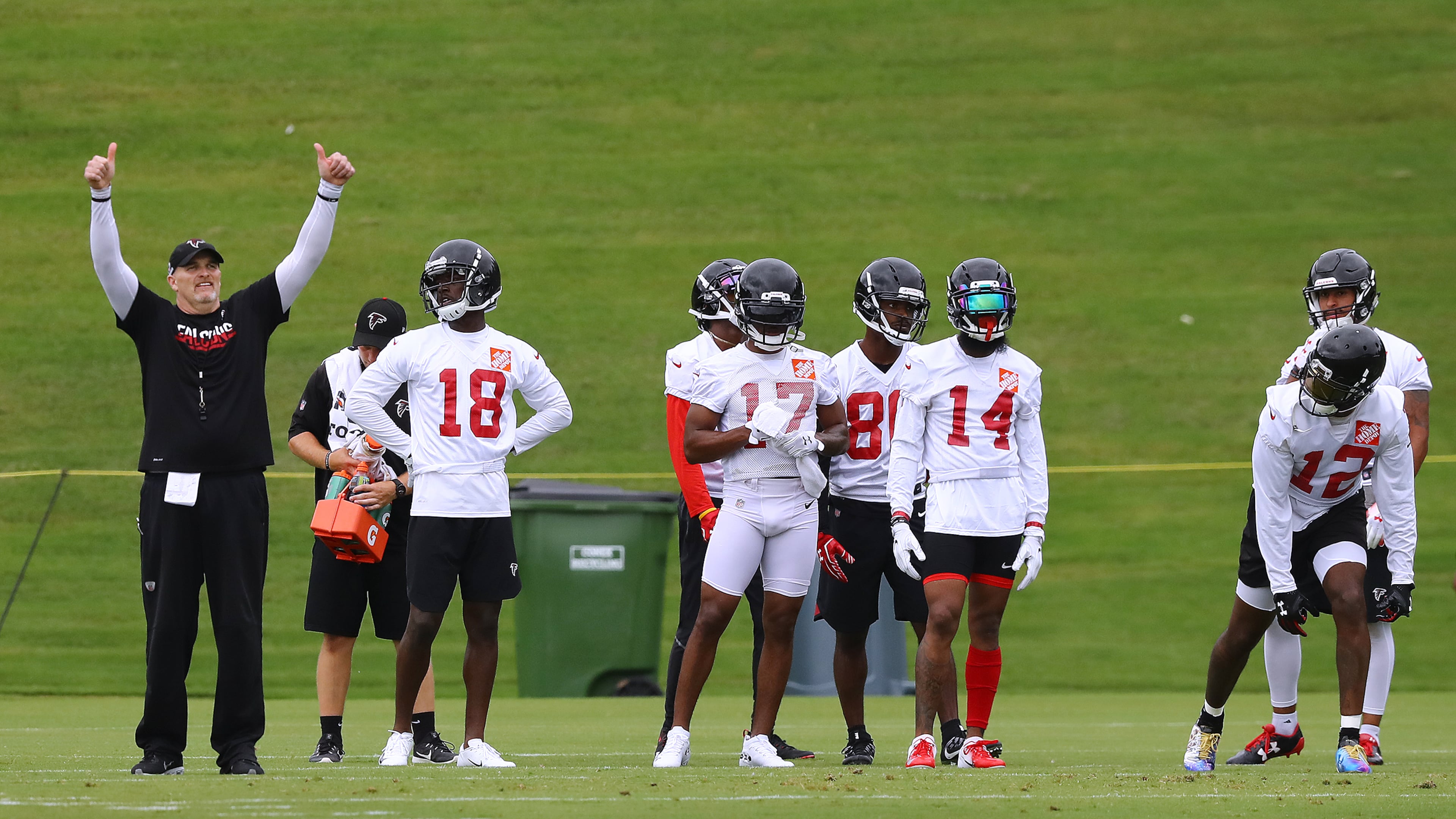The Falcons will try to make Julio happy. But can they?

Could they have seen this coming? Possibly. Over the past 10 months, the Atlanta Falcons made Devonta Freeman the NFL’s highest-paid back and Matt Ryan its highest-paid anything. With Julio Jones, once the league’s top-salaried receiver, slipping to No. 7, and with the Falcons taking another Alabama wideout in Round 1 this April … well, maybe they should have assumed some famous feathers would get ruffled.
That, we confess, is a classic second-guess. Truth to tell, I’m as surprised as the Falcons are. As coach Dan Quinn said after Tuesday’s Julio-free session of minicamp: “I certainly thought he would be here today.”
Beyond that, Quinn offered little: “Any conversations will stay private.”
To be fair, the Falcons had to believe they’d taken care of the great Julio three years ago. It wasn’t their fault the market for receivers went internet-bubbly this spring. They didn’t dump $75 million over five seasons on Jarvis Landry. (The Browns did that.) But it’s intriguing that, even when folks on the outside started to wonder what was up with Jones, the Falcons acted as if nothing was.
After he deleted the team’s logo from his social media, the Falcons suggested it was because he was seeking to set an example for Alabama players. (Though technically he hasn’t played for Bama since Jan. 7, 2010.) When Jones skipped Organized Team Activities, said Quinn he’d be at minicamp. He isn’t.
We assume this has to do with Jones’ dissatisfaction over his contract, though nobody has yet confirmed as much. The statement issued Monday night by general manager Thomas Dimitroff only said Jones wouldn’t be in attendance, not why. The closest Quinn came to light-shedding was saying, “Sometimes football and business intersect,” which we place in the file bearing the tab, “No duh.”
As for ramifications: Missing OTAs and minicamp shouldn’t amount to a hill of beans, but what the Falcons do to placate Jones will surely make work for in-house bean-counters. They need him because he’s a great player, but just because he’s a great player doesn’t mean they should – or even can – give him all he wants. (We’re assuming he wants a lot more than he’s getting.)
Shredding his contract and adding another three seasons to his remaining three isn't a real option. Incentives might offer a partial bridge, though those are tricky. (Here's a primer from Brian McFarland of Russell Street Report.) Loftier incentives fall under the heading of "not likely to be earned" and wouldn't count against that year's salary cap. If that incentive was earned, the money would count against the next year's salary cap. A "likely to be earned" incentive – essentially a "do-what-you-did-last-year" – counts against that year's cap, even if it's not achieved.
Meaning: There’s no free money. Sooner or later, everything counts against the cap. That’s about to become a major issue here. All these young defenders – Vic Beasley Jr., Grady Jarrett, Deion Jones, Keanu Neal – will be coming off rookie contracts. Ryan’s money is on the books. Freeman’s is, too. (Indeed, Freeman’s deal is the reason Tevin Coleman, who’s pretty good himself, could leave after this season. A team can’t afford two feature backs.)
Were this baseball, the Falcons could lock up everybody they really like for the next 10 years, pay a luxury tax and be done with it. The NFL’s hard cap makes teams make choices they’d rather not make. The hard cap makes a team with a good young roster – in the main, that describes the Falcons – prioritize in a way that will keep the core intact, if not the rind.
In a perfect world, you’d want Jones to be, as the team’s owner has said, “a Falcon for life.” But every dollar spent on Jones is one that can’t be invested in someone else, and there’s a chance we’ve seen the best of Julio. That’s not a rip: His best has been the best of any receiver since he entered the NFL. But he’s 29. He has a history of leg injuries dating to his time in Tuscaloosa. The Falcons want him on their team in 2018. But would they want him in 2022?
It’s still too early to start catastrophizing – What if he skips the full-blown training camp? What if he misses the season’s first month? What if he demands to be traded? – because the Falcons are apt to do everything in their power to accommodate his wishes. There, however, is the catch: Owing to contractual considerations both current and future, their power isn’t limitless? Question is, will Jones be satisfied with less than the moon? (A quarter-moon?)
Asked how Jones’ no-show affected the ballyhooed concept of Brotherhood – a banner bearing that word hangs above the practice field – Quinn said: “Would I like to have everyone here all the time? Hell, yeah.” We can’t yet know if this will prove the first crack in DQ’s blissful union. Heck, not long ago the Falcons didn’t know their best player was miffed. Pretty sure they do now.

